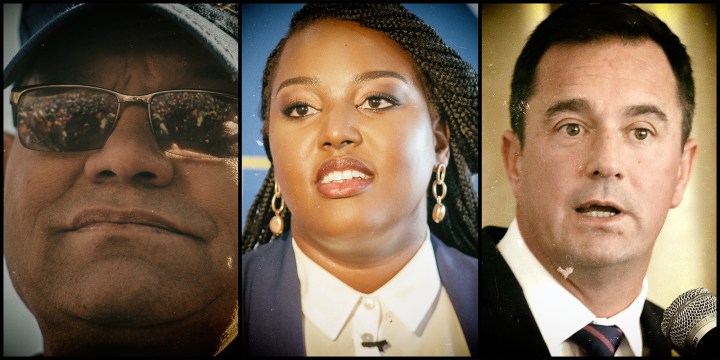ANALYSIS
A house divided cannot stand: DA’s fragmenting problem

That the DA is becalmed, or even going backwards, is no longer in doubt. Pressure is building and it is difficult to see how the party will emerge from it without suffering serious damage.
Over the weekend, more information emerged which indicates that the Democratic Alliance is losing support among voters. Research by Citizen Surveys published in Daily Maverick suggests that the level of support enjoyed by the party fell to 13% at one point last year. That’s a massive decline from the 20% it won in the 2019 elections. The party says, firmly, that it will bounce back from this, and that it will be able to redefine itself. But that process is becoming increasingly difficult. (Read the DA’s reaction here)
The DA’s problems in defining itself, particularly on issues relating to race, have a strong resonance with its forebear, the United Party, which lost support because it was not able to properly articulate its view on apartheid.
The DA said over the weekend that it disputes the poll finding that it has dropped to 13% of the vote, and that its own internal polling suggests it’s still above 20%. It is hard to know if this is true. The Ipsos polling was conducted towards the end of last year, just as the infighting in the party became public. Since then, an interim leader, John Steenhuisen, has been appointed, and the party has announced a timetable for the election of its new leader.
Still, it can’t be denied that the DA has been badly damaged by recent events. For nine months in 2016, SA’s politician with the highest approval rating was Mmusi Maimane. He has since left the DA. Herman Mashaba, who has been able to create a power base for himself, is now contesting against the party.
In the midst of this is the DA’s perennial problem: what is its position on race-based redress? It is clear that this will be the dominant issue of its policy conference, and probably its leadership election.
There is a legal wrinkle in all of this. The party says it needs to get a legal opinion on who decides its policy on race-based redress. It seems unsure whether this is the national congress or the Federal Council.
Considering the DA’s past use of the courts, it seems apt that this divisive issue should end up in a lawyer’s office.
No matter which way the lawyers go, this is an open goal for the party’s critics. It seems undemocratic to allow a Federal Council to decide the most divisive issue in the party, when its members could simply take a vote in a conference. The problem is that a vote could be equally as divisive, as the campaigning around that vote could further damage the party.
The DA is the most racially diverse party in South Africa, and if there is less social cohesion in the country the party is most affected by that.
For those with long memories, there are echoes of what happened with the United Party (UP) during apartheid.
The UP under the leadership of Sir De Villiers Graaff was the official opposition to the National Party in the 1950s. The party suffered a series of splits (which led to the formation of the Progressive Party with Helen Suzman as its lone MP in the whites-only Parliament). One of the major reasons for these splits was that the party was unable to articulate its stance on apartheid. Its leadership was not decisive enough on the issue.
There is a very real risk that the DA will find itself in a similar position.
If the DA cannot come to a proper resolution on the issue of whether race is a proxy for disadvantage, it may end up being hopelessly divided over it for a long period. This would make it impossible to define itself. It stands to lose members to other parties, whether they be to Mashaba’s new movement, the Freedom Front Plus or even the ANC (especially if President Cyril Ramaphosa is able to take action against his opponents in his party).
For the DA’s critics, this is a simple issue. Black people are poor, white people are rich. By and large, and generally speaking, this is true. Racialised inequality is one of the biggest problems SA faces (friends who agree on most things can debate whether it should come before or after poverty as our biggest problem).
Legislation that is meant to deal with this issue is ambiguous. As law professor Pierre de Vos has written, the Employment Equity Act (largely written by ANC MPs) prohibits the use of racial quotas and relies instead on equity “plans”. The Constitutional Court has dealt with the issue of quotas many times: the best-educated among us can disagree on what should actually happen.
This is the kind of debate that can swallow a party whole, because people who disagree all believe, fervently, that they are right. One of the DA’s three leadership candidates, John Moodey, told Newzroom Afrika the issue could completely divide the party.
The DA claims it is the party for all South Africans. This sentiment is leading to strife in the party. It’s difficult to see it going through the next round of turmoil without suffering further damage. DM

















